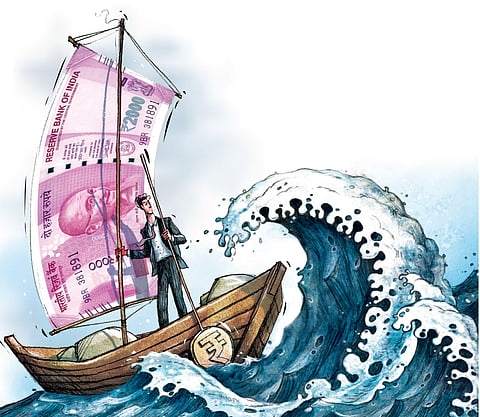

If the idea is to learn from the past, this is it. An imminent third wave of infections looms, according to most experts in India. Large economies like the United States and Europe are already going through a surge of the so-called ‘Delta Variant’. Economically, keeping money cheap and giving easy access to borrowers is the standard solution. Rich countries are already keeping interest rates near zero. Most of them can afford to do so as the US Dollar and Euro are primary reserve currencies.
A country’s response is based on the state of the government finances. India does not have the luxury of printing an endless amount of money as the Rupee is not a reserve currency. As a result, the government works on moving money to those who need them within the limitations of the budget.
The other key factor is any potential supply disruption due to food shortage or deficient rains. An analysis by CRISIL of rainfall in various states reveals that only Gujarat and Odisha are likely to witness poor rains this year. However, they are not significant contributors to the overall agricultural output in India. Hence, there is no need for any alarm, they argue.
“We expect the sector to grow at 3% year-on-year in the current fiscal (over 3.6% last fiscal),” CRISIL’s analysis said. A primary thing to watch for your money is the trend in the inflation rate. Thus far, India has stayed within reasonable limits and has kept consumer prices from spiralling.
Statements from the Reserve Bank of India suggest a preparation to tackle the economic impact of the third wave of infections. RBI Governor Shaktikanta Das, in his comments during the monetary policy committee meeting, highlighted the need to support growth. That means keeping borrowing rates low to ensure that borrowers who need money for expansion do not have a problem getting easy money.
Corporate borrowers who want to expand should be allowed to get the cash they need. That ensures little economic disruption does not create an artificial shortage of goods and services. The other aspect is about economic growth. Your money will grow if the businesses you invest in keep increasing revenue and profits. That is primarily linked to economic growth.
There is solid data for specific areas where the government needs to provide budgetary support or other intervention. While large companies have managed to keep using their strong balance sheets to fund expansion, the small and medium enterprises are struggling to even get back to the levels before the pandemic.
According to one analysis by CARE Ratings, a credit rating agency, of over 3000 companies for their financial performance, only 44% of them had sales higher than in 2019, the year before the pandemic. “This means that nearly more than half the sample companies have not yet reached their 2019 levels,” the analysis said. The performance is driven mainly by large companies, and nearly half of those companies have not recovered from the double lockdown.
A third lockdown would create further distress for smaller and medium enterprises. These entities make most of the employment in the organised sector. If they remain distressed, there can be no economic growth.
From your standpoint, if the government does not support small businesses, that is terrible news. You need India to steadily grow so that businesses thrive and create jobs for not just years but decades. Any halt to this cycle could seriously damage your prospect of generating a steady return on equity or equity-linked assets.
A potential third wave means you have to prioritise the health of yourself and your loved ones first. The only way to fight any spread of infections is by getting vaccinated. In that context, the government has recently allowed a vaccine to be administered for children aged 12-17. However, the fear in the third wave is that it would affect the younger, unvaccinated population more than the old. As you await your child’s vaccination, continue to follow Covid-19 protocols and restrict visits to crowded places.
Once you have ensured that, you move your attention to your finances.
(The author is editor-in-chief at www.moneyminute.in)